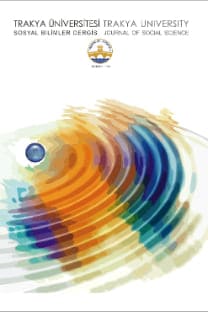ÇEVİRİBİLİM TARTIŞMALARI GÖLGESİNDE ÇEVİRİ ÖĞRETİMİ VE ÇEVİRİ DİDAKTİĞİ GEREKSİNİMİ
Kültürlerarasında köprü işlevi gören 'çeviri‘nin tarihi, dilin tarihi kadar eskidir. Çeviri etkinliğinin gözlemlenerek bilimsel araştırmanın nesnesi olma süreci ise oldukça yenidir. Çevirinin çok boyutluluğundan dolayı, alana yakın diğer bilim disiplinlerinin verilerinden yararlanılmaktadır. Bu yönüyle çeviri araştırmalarının disiplinlerarasılık özelliğine vurgu yapılmaktadır. Çevirinin akademik bir disiplin olarak yükseköğretim programları arasında yerini alması, bu etkinliğin öğrenilmesi ve öğretilmesinin kuramsal alt yapısının da oluşmasını gerektirir. Çeviri eğitimi söz konusu ise didaktik altında çeviriye özgü yaklaşımların bulgulanması beklenir. Çevirinin akademik bir disiplin olmasının çıkış noktası, çeviri uygulamalarının betimlenebilir olduğu ilkesidir. Belli bir kuramsal çerçevenin varlığında çeviri öğretilebilir ve öğrenilebilir. "Kesin ve tek bir çeviri anlayışı elbette yoktur;" ancak, "nasıl" sorusunun cevapsız bırakıldığı bir öğrenme ortamı da düşünülemez. Bu çalışmada, akademik bölümlerin eylem alanını belirleyecek çeviri didaktiğinin gerekliliği tartışılacaktır. "Çeviribilim çalışmalarında bütünleyici bir kuram gerekli midir?" sorusu bu çalışmada irdelenmeyecektir. Üniversitelerde çevirinin öğretilebilirliği ve çeviri uygulamalarına ilişkin veri oluşturabilecek deneysel bir gözlem Mersin Üniversitesi Almanca MütercimTercümanlık öğrencilerinin çeviri uygulaması bağlamında değerlendirilmiştir. Çeviri sürecinde kaynak dilde [burada öğrencilerin anadilinde; yani, Türkçede] metinsellik boyutunda yeterlilik süreci değerlendirilmiştir. Türkçede metin oluşturma alışkanlığının eksikliği başat sorun olarak saptanmıştır
TRANSLATION EDUCATION AND THE NECESSITY OF TRANSLATING DIDACTICS IN THE SHADE LINE OF ARGUMENTS CONCERNING THE SCIENCE OF TRANSLATION
The history of "translation" that functions as a bridge in the world of intercultural is as old as the history of the language. But nonetheless it is relatively a new date that the operation of translation is seen as an object of scientific observation and research. Because of complexity of translation, the results and instruments of near or neighbour disciplines are preferred. Due to this perspective the translation studies are emphasised as an interdisciplinary field. In the development of this field, these interdisciplinary processes were often shown as a reason for the disorder. The fact that translation as an academic discipline ranks in the curricula of higher education requires that the base for learning and teaching this subject matter and furthering the theoretical supplements must be built up. Concerning the translation education, the discovering of translation-specific approaches beneath the didactics is expected. As far as the conception of the theoretical base is completed, the translation didactics that is a need of the discipline can be built up. The starting point for the academic discipline of translation is founded on the principle that the translation acts can be described. With such a methodical and theoretical base, translation can be taught and learned. "Surely, there is no precise and one only translation conception", but, one can‘t figure out that in the situation of learning the question "how" has no response. In this study, the necessity of translation didactics which helps determining the strategic spaces of the academic departments established will be discussed. The question "whether there is a need for a complementary theory in the studies of the science of translation?" will not be argued in this study. In the study, concerning the teachability of translating at universities it is assessed an experimental observation of a translation application at the departement of German Translation and Interpreting of the University Mersin (Turkey). This assessment can deliver some datas regarding the apply of translation. It is evaluated the capacity of the students in improving their textual knowledges during the translation process in the source language (in the native language of the students, that means turkish). It has been stated, that the primarily problem is the deficit of praxis in producing texts in turkish
